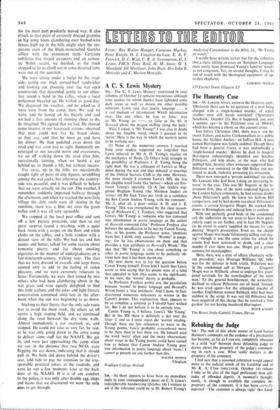The Hanratty Case
SIR,—Mr Lawson writes, apropos the Hanratty case: `Obviously there can be no question of a man being charged with a single-handed murder, of which another man still stands convicted' (Spectator's Notebook,' October 21). But it happened, just over a century ago—in the Pelizzioni case of 1864-65, which has become a classic on this account alone.
Just before Christmas 1864, there was a row be- tween Italians and native Clerkenwellians in a public house, the 'Golden Anchor,' on Saffron Hill. A man named Harrington was fatally stabbed. Though there had been a general fracas, it was undoubtedly a `single-handed murder.' Before he died in hospital Harrington unhesitatingly identified one Serafino Pelizzioni, and him alone, as the man who had stabbed him. Several other witnesses supported him. Pelizzioni was convicted at the Old Bailey and sen- tenced to death, violently protesting his innocence.
There now emerged a 'private individual' (to echo Mr Lawson) who had been 'taking an increasing in- terest' in the case. This was Mr Negretti of the in- strument firm. One of the most respected figures in the London Italian community, he had serious doubts about Pelizzioni's guilt. He knew his Saffron Hill compatriots, and he had doubts too about Pelizzioni's cousin, a certain Gregorio Mogni. He tracked him down in Birmingham and induced him to confess.
With one perfectly good body in the condemned cell the authorities do not seem to have been parti- cularly eager to act further, and in fact Mr Negretti (as he stated in court) 'supplied the means for con- ducting' Mogni's prosecution. Even so, the charge against Mogni was made 'feloniously killing and slay- ing'—though it was the same crime for which his cousin had been sentenced to death, and a clear murder if ever there was one. Mogni got a prison sentence for manslaughter.
`Here, then, was a state of affairs absolutely with- out precedent,' says Montagu Williams, QC (who was for the defence in both trials). 'Pelizzioni was in the condemned cell at Newgate . . . Gregorio Mogni was in Millbank, about to undergo five years' penal servitude for the manslaughter of the same man.' To the general bewilderment, the authorities declined to release Pelizzioni out of hand. Instead, he was tried again—for the attempted murder of another Englishman named Rebbeck who had been stabbed in the scrap. It was not till Pelizzioni had been acquitted of this charge that he received a 'free pardon' for not having murdered Harrington.
PETER KNIGHT
The Roost, Stoke Gabriel, Totnes, Devon






































 Previous page
Previous page